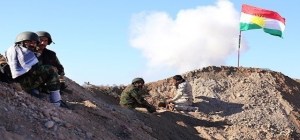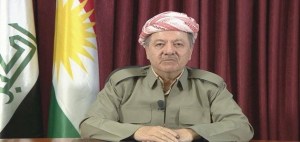nsnbc : An Iraqi court in the capital Baghdad has issued arrest warrants for members of the Kurdistan Autonomous Region’s High Electoral and Referendum Commission on charges of supervising the referendum on September 25 contrary to a ban issued by Iraq’s highest federal court. Iraqi Prime Minister al-Abadi was ambiguous about the possible arrest of Kurdistan President Masoud Barzani who warned that Baghdad would be blamed for any possible attacks against Kurdistan.
Abdulstar Bayraqdar, speaking for the high judicial council said “The Rusafa Investigation Court has issued an arrest warrant for the head and members of the commission who supervised the referendum in the Kurdistan Region.” The Rusafa court is located in the federal Iraqi capital Baghdad. “The verdict was issued after the National Security Council filed a lawsuit arguing that the referendum was contrary to the decision of the high federal court,” he explained.
Iraq’s National Security Council, under the authority of Prime Minister Haider al-Abadi, stated on Monday that it had compiled a “list of names” of “state employees within the Kurdistan Region” who stand accused of holding the referendum. Abadi said the state will take “legal measures” against them through the office of the public prosecutor.
Asked whether Baghdad will now issue an arrest warrant for Barzani, who called for the vote, Abadi said on Tuesday, “some names were mentioned within that frame… we are awaiting legal procedures in this regard.”
The Kurdistan Regional Government (KRG) for its part, responded to remarks made by PM al-Abadi on Tuesday about possible confrontations between Iraqi troops or the Shiite Hashd al-Shaabi on one hand and Kurdish Peshmerga on the other. The KAR stressed that al-Abadi was the one who threatened the Kurdistan Autonomous Region and that he was to blame for any eruption of clashes between the Kurdish and Iraqi forces especially in Kurdistan or in the disputed areas claimed by both Baghdad and Erbil. The Kurdistan Regional Government stressed:
“Mr. Haider al-Abadi in his comments several times threatened the Peshmerga to not deter the army and armed forces of Iraq in the disputed areas. Hence, we are informing the whole world that after these threats made, Haider al-Abadi, the prime minister and commander-in-chief of the armed forces is to blame for any disputes or violence which may erupt in disputed areas.”
Abadi on Tuesday warned the Peshmerga against any “confrontation” with Iraqi security forces, including the mainly Shiite Hashd al-Shaabi, in those areas, while calling on the Kurdish fighters to act on orders from the Iraqi government, as there should be “one leadership, not two.” Earlier this evening, the Kurdistan Region Security Council (KRSC) also warned in a tweet that that they were “receiving dangerous msgs Iraqi forces, [including] PMU & Fed Pol, are preparing major attack in South/West Kirkuk and North Mosul on Kurdistan.”
The KRG stressed that Prime Minister al-Abadi’s attempt to resolve outstanding issues by means of sanctions and collective punishment with the help of neighboring countries – Iran and Turkey – would lead to bad results, destroy the power-sharing basis in Iraq and marginalize the partnership and decision making mechanisms between Erbil and Baghdad which were two essential tenets of the Iraq constitution. Moreover, the KRG stressed that Baghdad’s policy resulted in destroying Iraq and the death of hundreds of thousands of Iraqi people and the displacement of millions.”
The KRG proposed that a governing and political dialogue should start between the Kurdistan Regional Government, the Iraqi government and all parliamentary factions in the federal parliament as well as the KAR’s parliament in order to resolve all of the unresolved issues and disputes. The KRG also reiterated that it always was and still is serious about dialog with Baghdad but that Baghdad’s lack of response to Erbil’s grievances forced the region to hold the referendum.
As an example for Baghdad’s hostile stance, the KRG stressed that Iraqi Prime Minister al-Abadi had held secret talks with Iran and Turkey on how to contain the region instead of talking with them and that doing so was “very abnormal” for one who purports to be interested in resolving disputes through talks.
Moreover, on Tuesday al-Abadi categorically rejected any calls for negotiation, mediation, or initiatives with Erbil in which the referendum and the situation could be discussed without rejection of the independence. Instead, al-Abadi confirmed coordination with Turkey and Iran as the central government seeks to exert control over the Kurdistan Region.
Addressing the Iraqi nation during his weekly press conference, al-Abadi said any talks with the Kurdistan Region must respect three conditions that are not up for negotiation: “the unity of Iraq, the Iraqi constitution, and rejecting the result of the referendum.” “We will not discuss the referendum or its results,” Abadi stated as he refused Kurdish claims that they are open for dialogue. The Kurdistan Region has set a condition by refusing to cancel the effect of the vote, while al-Abadi categorically rejects this demand.
The KRG lashed out at military drills jointly launched in the course post-referendum period, describing them as “intimidating” against the people of Kurdistan and “training to occupy the border-crossing gates with the help of Iran and Turkey.” The KRG says al-Abadi is calling neighboring countries to help implement its plans against the Kurdistan Region including border closure and other measures which amount to “political decisions” and are meant as “collective punishment” against the people of the Kurdistan Region with the help of neighboring countries which are “unconstitutional decisions” and that they are “outright calls” from the neighboring countries to punish a segment of the Iraqi nation.
The KRG urged “the Iraqi parliament not to be silent if it really wants to monitor the implementation of the constitution.” The KRG also described the consequences of Iraqi government’s punitive measures against Erbil which include flight bans, border closure, troop deployments and recently the relocation of telecommunication companies to Baghdad as “detrimental to the people of Iraq as well as a whole, making Iraq to suffer an internal sanction as currently the army, police and other Iraqi forces’ check points disallow the entering of fruits, vegetables and many kinds of food to other Iraqi areas from the Kurdistan Region, and thus, increase in prices are on the shoulders of the Iraqi citizens.”
The KRG added Baghdad had also cut oil shares to those areas in Diyala province who voted in the referendum. To put an end to all these “collective punishments”, the KRG stressed that it “once again calls on Mr. Haider al-Abadi that we are ready for every kinds of talks and helps according to the Iraqi constitution about border crossing gates, internal trading, the provision of services to citizens, banks and airports.”
CH/L – nsnbc 12.10.2017
Source Article from https://nsnbc.me/2017/10/12/amidst-concerns-about-war-iraqi-court-orders-arrest-of-members-of-kurdistans-high-electoral-and-referendum-commission/
Related posts:
Views: 0
 RSS Feed
RSS Feed

















 October 12th, 2017
October 12th, 2017  Awake Goy
Awake Goy 












 Posted in
Posted in  Tags:
Tags: 
















